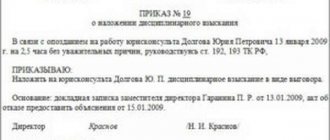Is it possible to indicate a place of work without a specific address?
According to Art. 57 of the Labor Code of the Russian Federation, one of the mandatory conditions of an employment contract is the place of work. In the event that an employee is hired to work in a branch, representative office or other separate structural unit of an organization located in another area, it is necessary to indicate in the contract the place of work, indicating the separate unit and its location.
The Labor Code does not explain how to formulate this condition. In general, indicating in the employment contract the specific address at which the employee performs his work function as the place of work is not mandatory. This means that the employer has the right to provide both the full address of the company, as well as its name and the city in which it is located, without the street and house number. For branches and divisions in another city, the location must be indicated.
The Review of the practice of considering cases related to the implementation of labor activities by citizens in the regions of the Far North and equivalent areas (approved by the Presidium of the Armed Forces of the Russian Federation on February 26, 2014) states that in the theory of labor law, a place of work is understood as located in a certain area (settlement). a specific organization, its representative office, branch, other separate structural unit. If the organization and its separate structural unit are located in different locations, based on part two of Art. 57 of the Labor Code of the Russian Federation, the employee’s place of work is specified in relation to this structural unit.
The place of work can be understood as the name of the employer and its location, or as the actual place where the employee performs his work functions.
The position of the RF Armed Forces is clear, since the place of work is the organization itself where the employee works. The organization is characterized by name and location. The location of a legal entity is determined by the place of its state registration on the territory of the Russian Federation by indicating the name of the locality (municipal entity) (Article 54 of the Civil Code of the Russian Federation).
Accordingly, as a place of work, the employer has the right to indicate only the name of the organization and the city where it is located, without the street and house number.
The legality of stating the place of work by indicating the name of the organization and the city in which it is located was also noted by the Bryansk Regional Court. In the case he examined, the GIT inspector ordered that the missing condition be indicated in the employment contract with the employee, namely the place of work - a separate or structural unit and its location. But since all the separate divisions of the employer were located within the same locality (city), the court did not see the need to specify the address of the place of work (Appeal ruling of the Bryansk Regional Court dated August 14, 2012 in case No. 33-2598/12).
The possibility of indicating a place of work without mentioning a specific address also follows from Part 3 of Art. 72.1 Labor Code of the Russian Federation. The wording of this norm allows us to conclude that the legislator allows that the movement of an employee from a certain employer to another workplace or to another structural unit located in the same area does not entail a change in the terms of the employment contract determined by the parties.
Therefore, we believe that the condition regarding the place of work in an employment contract can be formulated by indicating the name of the employer and the location in which the employee will actually perform his work function, for example:
The employee’s place of work is the State Budgetary Institution “Maternity Hospital No. 5” (Moscow).
What is a workplace
The definition of a workplace is given in Art. 209 Labor Code. This is the place where the employee performs work duties. This is where the employee needs to come in connection with his work, it is directly or indirectly controlled by the employer. The workplace can be a place at a desk in an office, behind a machine, at a store counter, etc.
The workplace condition is additional, and an indication of its inclusion in the employment contract is optional. This can be done solely at the request of the employer. To confirm this, the employer can rely on paragraph. 2 hours 4 tbsp. 57 of the Labor Code, as well as the position of the Supreme Court, which it set out in paragraphs. a) paragraph 35 of the Resolution of the Plenum of the Supreme Court of 2004 No. 2 “On the application of the Labor Code by the courts of the Russian Federation.”
Since the workplace does not have to be specified in the text of the employment contract, it is better not to specify it. Otherwise, any movement of an employee, even within the same building, will have to obtain permission.
Where is your place of work?
In the company's office, in production I work on a shift basisWork with a traveling nature I work remotely I work in a representative office of a large companyOther
What difficulties may arise when specifying a specific address?
When indicating as a place of work not only the name of a locality, but also the specific address of the organization, certain difficulties may arise. For example, if an enterprise moves to another area of the city, it will be necessary to obtain consent to change the mandatory terms of the employment contract from the employee. If the street and house number are not indicated in the employment contract, the place of work does not change, since the move takes place within the same locality.
Determining the place of work by locality (without specifics) can be important if the employer has several separate divisions, such as shops, in one locality. In this case, indicating the name of the organization as the place of work (possibly with the clarification that the work will be performed in a chain of stores) will mean that the employer can send the employee to any of the chain stores in the city. Even if stores are located at a significant distance from each other, sending an employee to different stores will not require additional consent from the employee. As a result, the employee’s arguments about changing the work schedule and personal inconvenience as a result are not taken into account (Appeal ruling of the Irkutsk Regional Court dated August 18, 2016 in case No. 33-11462/2016).
The place of work is a separate structural unit.
There are two possible scenarios here.
An employee is accepted into a branch, representative office or other separate division located in a different area than the parent organization. According to the rules of Art. 57 of the Labor Code of the Russian Federation, if a separate structural unit of an organization is located in another area, then the employment contract reflects the place of work indicating the separate structural unit and its location. That is, labor legislation obliges a detailed indication of the place of work when an employee is accepted into an organization that has a complex organizational structure. In such a situation, the name of the employer is not enough; it is necessary to indicate which branch, representative office or other separate structural unit located in another area the employee is accepted into, and indicate his location - the exact address.
By location it is logical to understand the specific address of the structural unit in which the employee works.
Here is an example of a possible wording of a condition regarding the place of work if an employee is hired into a separate structural unit:
1.3. Place of work: State Budgetary Institution "Arzamas Regional Hospital", paramedic and obstetric station, village. Vetoshkino, Arzamas district, Nizhny Novgorod region, st. X, no. 13.
The employee is accepted into a separate structural unit, which is located in the same area as the organization itself. In this case, information about the place of work in the employment contract may not be specified. We draw this conclusion based on the following. Paragraph 16 of the Resolution of the Plenum of the Armed Forces of the Russian Federation dated March 17, 2004 No. 2 c states that structural units should be understood as branches, representative offices, as well as departments, workshops, sections, etc., and by other locality - locality outside the administrative boundaries territorial boundaries of the corresponding locality.
The obligation to indicate in the employment contract the location of a separate subdivision is provided for by the Labor Code of the Russian Federation only for the case when a separate subdivision is located in a location other than the head office of the organization, outside the administrative boundaries of the locality indicated in the employer’s constituent documents as the place of state registration.
Accordingly, if the branches are located within the same locality, the employer has the right not to specify that the employee is being hired at a branch located in the same city. At the same time, as an analysis of judicial practice has shown, GIT inspectors sometimes make claims to employers, demanding specification of the place of work. To minimize controversial issues and conflicts with regulatory authorities, we suggest formulating the terms of the place of work in the employment contract approximately as follows:
1.3. Place of work: State Budgetary Institution "Nizhny Novgorod Regional Children's Hospital", structural unit "Children's Clinic", Nizhny Novgorod, st. N, no. 88.
In this case, it will not be possible to move an employee from one structural unit to another without consent to change the terms of the contract. It will be necessary to conclude an additional agreement and complete the transfer.
Contents and sections
The agreement must reflect the following information:
- Details and information about the parties. The number of the agreement, the date of its preparation, and the place of execution are indicated. Full name must be indicated. citizen, company name, full name. and the position of representative of the organization.
- General provisions. The section indicates who is being accepted for what position. The text records the fact of part-time work and indicates the duration of the contract. When concluding an employment contract with the general director, permission for part-time work is required from the owner of the organization.
The working hours in a part-time employment contract must be included in the text.
- Rights and responsibilities of an employee.
A citizen has the right:
- to provide specified work;
- for safe working conditions;
- for full and timely remuneration;
- other rights provided for by law.
The employee undertakes:
- perform the duties assigned to him;
- follow the internal rules;
- treats the tenant's property with care;
- comply with labor protection requirements.
In addition to standard provisions, a number of specific responsibilities should be included in the text of the document. It is unlikely that a separate job description will be developed for such an employee.
Thus, an employment contract with a part-time accountant may include a number of responsibilities:
- carry out reconciliations with counterparties regarding the facts of deliveries;
- issue invoices for the shipment of goods and material assets.
- Rights and obligations of the employer.
The employer can:
- adopt regulations affecting the activities of the employee;
- reward an employee for effective work;
- hold him accountable for the offenses committed;
- require the employee to perform his duties.
The employer is obliged:
- provide the employee with the agreed work;
- ensure safety in the workplace;
- provide the necessary tools and materials;
- transfer the agreed remuneration on time.
Payment Regulations
It is important to reflect in the document how much the employee will receive for his work. An alternative option is to establish production standards with appropriate payment based on results
An alternative option is to establish production standards with appropriate payment based on results.
- Social insurance is carried out in accordance with the legislation of the Russian Federation.
- The parties may be held liable in accordance with the standards established in the regulations of the Russian Federation.
- Other conditions. Persons can stipulate the procedure for storing trade secrets, processing personal data, etc.
- The procedure for changing and terminating an employment contract. An employee working part-time can be dismissed on special grounds. The agreement terminates if a full-time person is found to fill the position.
The text of the agreement is changed with the consent of each party.
- At the end of the document, the names of the parties, addresses, details are indicated, and signatures are placed. A part-time employment contract with a director, drawn up according to the sample, is signed by a representative of the organization’s governing body, for example, the chairman of the general meeting of participants.










